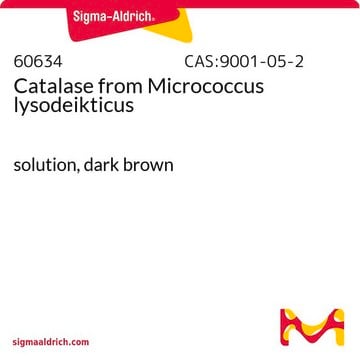LY0100
Lysozyme Activity Kit
sufficient for 100 tests
Synonym(s):
Lysozyme assay kit
Sign Into View Organizational & Contract Pricing
All Photos(1)
About This Item
UNSPSC Code:
12352202
NACRES:
NA.26
Recommended Products
usage
sufficient for 100 tests
storage temp.
2-8°C
General description
The Lysozyme Detection Kit provides ready-to-use reagents for detecting the presence of lysozyme activity. This simple assay to detect lysozyme activity uses Micrococcus lysodeikticus cells as the substrate. Lysozyme activity results in the lysis of the Micrococcus lysodeikticus cells. During incubation of the lysozyme sample and substrate, the reaction is followed by monitoring the decrease in absorbance at 450 nm.
Application
Lysozyme Activity Kit has been used to measure the catalytic activity of native lysozyme, lysozyme purified from chicken egg white and lysozyme from pilocarpine-stimulated saliva.
Biochem/physiol Actions
Lysozyme hydrolytically cleaves the bonds between N-acetyl-D-glucosamine and N-acetylmuramic acid residues (GlcNAc β1-4Mur) in mucopolysaccharides and the glycan skeletons of the corresponding peptidoglycans (the latter are glycosaminoglycans linked to or crosslinked by peptide chains). Lysozyme effectively destroys the cell walls of bacteria.
Storage and Stability
The Reaction Buffer is stable for at least 2 years at 2–8 °C.
The Lysozyme (Catalog Number L6876) may be stored long term at –20 °C and remains active for 4 years.
The Micrococcus lysodeikticus cells (Catalog Number M3770) should be stored long term at –20 °C.
The Lysozyme (Catalog Number L6876) may be stored long term at –20 °C and remains active for 4 years.
The Micrococcus lysodeikticus cells (Catalog Number M3770) should be stored long term at –20 °C.
Signal Word
Danger
Hazard Statements
Precautionary Statements
Hazard Classifications
Resp. Sens. 1
Storage Class Code
11 - Combustible Solids
Flash Point(F)
Not applicable
Flash Point(C)
Not applicable
Certificates of Analysis (COA)
Search for Certificates of Analysis (COA) by entering the products Lot/Batch Number. Lot and Batch Numbers can be found on a product’s label following the words ‘Lot’ or ‘Batch’.
Already Own This Product?
Find documentation for the products that you have recently purchased in the Document Library.
Customers Also Viewed
Silica Nanopollens Enhance Adhesion for Long-Term Bacterial Inhibition.
Song, H., et al.
Journal of the American Chemical Society, 138, 6455-6462 (2016)
Paula Chequer Gouveia Mól et al.
Journal of chromatography. B, Analytical technologies in the biomedical and life sciences, 1044-1045, 17-23 (2017-01-09)
In this study, a supermacroporous polyacrylamide cryogel was produced by cryo-polymerization and activated with Tris(hydroxymethyl)aminomethane (Tris-cryogel) to be applied as an affinity ligand for a one step purification of lysozyme (LYZ), directly from chicken egg white (EW). The Tris-cryogel presented
Dan Bi Lee et al.
Scientific reports, 8(1), 2541-2541 (2018-02-09)
Time-resolved serial femtosecond crystallography with X-ray free electron laser (XFEL) holds the potential to view fast reactions occurring at near-physiological temperature. However, production and characterization of homogeneous micron-sized protein crystals at high density remain a bottleneck, due to the lack
Tao Wang et al.
Chemical science, 7(5), 3234-3239 (2016-05-01)
Water-soluble allyl sulfones provide convenient site-specific disulfide rebridging of native proteins and cyclic peptides. The site-selective functionalization of (a) the peptide hormone somatostatin, (b) the interchain disulfide of bovine insulin and (c) functionalization of the proteins GFP and lysozyme with
Ji-Won Jang et al.
Chemosphere, 260, 127611-127611 (2020-08-08)
Mercury (Hg) is known as a highly toxic heavy metal, and its toxicity varies depending on its form due to different toxicokinetics between inorganic and organic Hg. Limited information on comparison of Hg toxicity concerning its chemical form by oral
Our team of scientists has experience in all areas of research including Life Science, Material Science, Chemical Synthesis, Chromatography, Analytical and many others.
Contact Technical Service











